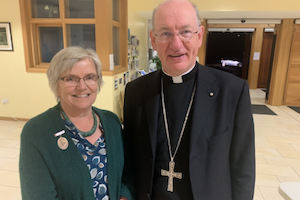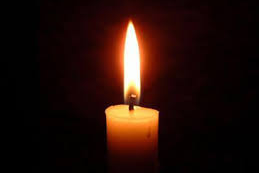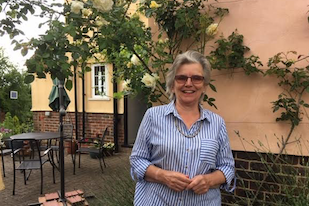Reflection on my mother's funeral

image ICN
My mother died recently - she had been ill for many years and during that time received Holy Communion at home from a special minister of the Eucharist. She had been anointed several times, most recently the month before she died. After she died we had a Requiem Mass before she was buried in the local village graveyard.
Over the years I have taken Holy Communion to the sick in their homes, and I have been at many Requiem Masses for friends, and parishioners. But this was the first time I have been quite so intimately involved.
While my Mother was in hospital the nun who regularly brought her Holy Communion also offered me communion with my mother, and again when she was anointed, I too, was offered communion.
I was struck by my own reactions. Receiving communion with my mother gave me a real sense of being in communion with her at that time. It was a difficult time in many ways so the strength and courage I received just cannot be estimated. I felt a sense of renewal. I could support her where she needed me. While my mother was in hospital I tried to go to Mass, but the readings of the day and the homily bore so little resemblance to what I was going through that I left before the end.
After she died, arranging her requiem was relatively straight forward. My mother had told us many times what she wanted, and we found a further letter of instructions. I have organised many liturgies in the past so I knew what I was doing. I also knew the work of arranging a liturgy can make it hard to pray until afterwards, you are so busy watching to see that everything goes smoothly. This time however, the liturgy carried me; I was held safely by the love and prayer of the community, through the action at the altar.
My mother's requiem involved the coming together of many of her family, and her friends and ours. As we arrived at the funeral there was much hugging and kissing of cousins and friends who were happy to be together. We talked about my Mother, and we were able to express our sadness at her death and also the relief that she was now out of pain. I had a real sense that this was the beginning of Mass, a putting everything into the context of the way the liturgy would continue. We were able to greet each other and recognise that we were all there to pray for my mother as she starts her next journey, and to pray for us, the bereaved.
My sister and I sat at the front of the church with our immediate family near us. We placed my mother's missal, bulging with memories, on the coffin, together with her crucifix, which she acquired when her school was pulled down. My sister gave a tribute and we relaxed into the familiarity of mass. Family members all took their part, with the readings, the prayers, singing and processing.
There was a sense that the whole liturgy was an extension of family, we celebrate meetings and partings, weddings and funerals and a requiem sustains and supports everyone with the assurance of a loving and merciful father. The signs and symbols of the requiem, the white vestments, the paschal candle, the holy water and incense speak of the living and of the dead, and speak hope of promised eternal life.
The penitential rite mentions sin. So often we are careful not to speak ill of the dead. But the penitential rite is real. It gives us permission to remember the rows, the words that hurt, the disagreements which are the reality of family life.
We chose a reading from Thessalonians which spoke of hope and the promise for us of eternal life. 'So we shall stay with the Lord forever. With such words you should comfort one another'. The psalm gave us that comfort, recognising the deep shadows but offering that God filled comfort for which we all search.
We chose the beatitudes for the gospel; the beatitudes encourage us all in our faith. When it was suggested that my mother had not suffered by people reviling and persecuting her on the Lord's account, I remembered the difficult time she had in hospital. The way the elderly are treated in hospital is not the way the human face of Christ should or would be treated.
During the homily the celebrant spoke of the promise of resurrection. And he spoke of our questions, no one has come back to tell us what happens to us when we die. We have the glorious questioner, Thomas, who said 'unless I see I refuse to believe, and Jesus said 'blessed are they who have not seen and yet believe'. We have the mystery of life and death, and yet in faith we accept. And as we celebrate Jane's life we should give thanks for all she achieved and our presence in the church today is part of that. And he spoke of how Jane loved us, and not just Jane, but God loves us too. And God used Jane as a channel of his love for each one of us. He also spoke about my mother being realistic; he said she was wise, she knew that she was not without sin. And we have all come together in loving faith to pray to our loving Father who longs to forgive her and each one of us.
And he posed the question, what is happening to Jane today. What do we believe is happening to her? We say we profess our faith, but what does that mean to each one of us now. And so we prayed for the goodness of Jane and what she left us, and how we can make her love live on in how we live our lives into the future.
And somehow throughout Mass that sense of joy and hope and faith filled the Church. We were able to pray for my mother, and for ourselves and for others. Receiving Communion united us with the saints of the past, the present and the future. There was a feeling of the whole, and in that a comfortableness about being there.
The committal - our final farewell. The words of the committal have an incredible finality about them. The silence when the priest incenses the coffin, and venerates the coffin. The physicality of my mother really being there, and then being taken to be buried in the earth. We are a real people, our Christianity is not a purely spiritual, ethereal experience it is part of our earthiness, and it is the whole of us. A granddaughter sang 'May the choirs of angels come to greet you' from the choir loft. And if the angels didn't hear then, they never would! I really felt this meant heaven was so real, and we were letting go of the physical body for the moment. There was no opportunity to go back, to say it hadn't happened, it was all a bad dream.
Later that day we buried my Mother in a country grave yard with my Father; for an unconnected reason we returned to the grave an hour later, and to see it filled in with a small cross marking the grave with both parents names was a final gesture. A final farewell.
The church offers us liturgies to support us at all times of our lives, and not just us as recipients but all those who share in those liturgies; to all those who participate they offer more than can be expressed or properly understood. I was glad we celebrated my Mother's life and death with the full rites of the Catholic Church; I was supported and sustained by those liturgies at the time and into the following difficult weeks. And I would always encourage others to allow themselves to be touched by such opportunities.
Jo Jacques, is chaplain at More House School, Farnham. With a background in nursing, she has a MA in Pastoral Studies from Heythrop; a Diploma in Pastoral Ministry from Allen Hall, and studied Pastoral Education at the Maudsley Hospital. Married with three children, and a grandson, she has previously worked as a prison chaplain and hospital chaplain. Jo is a parishioner at St Joseph's, Guildford.


















